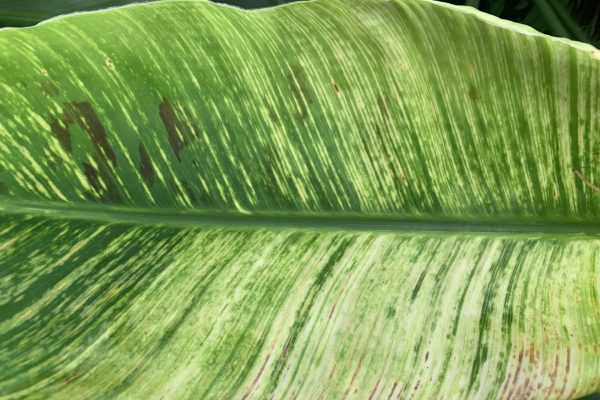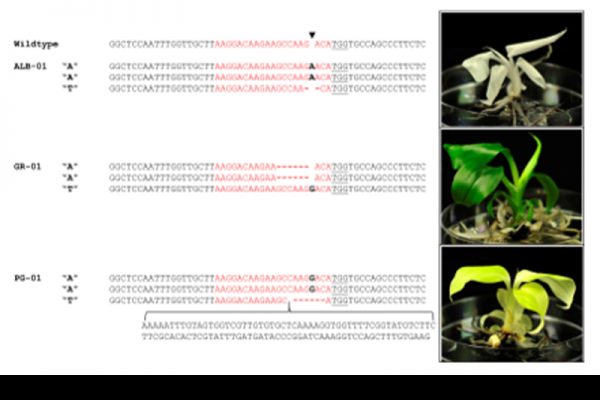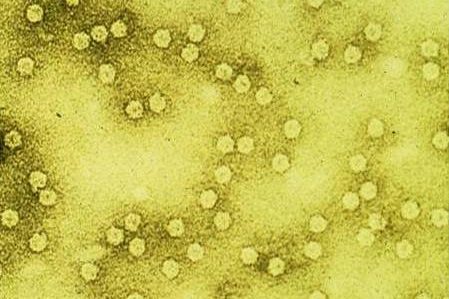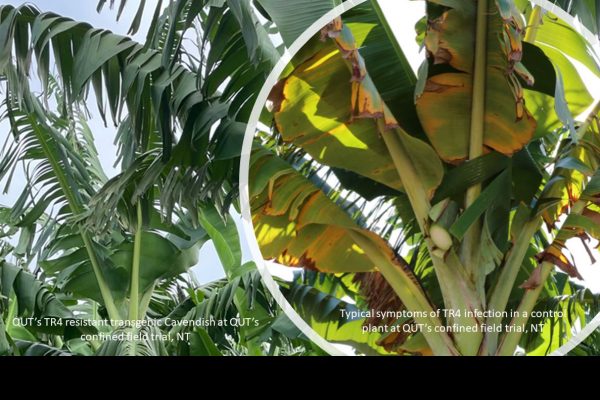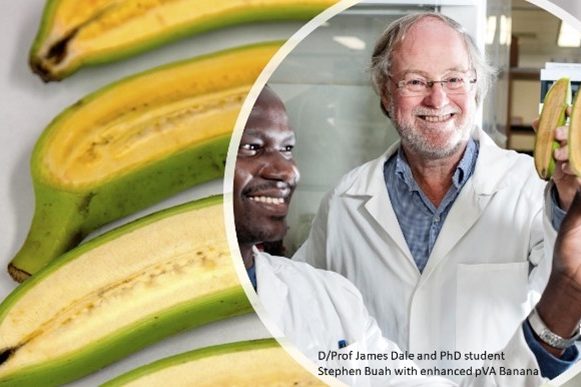The Centre for Agriculture and the Bioeconomy’s Banana Biotechnology Program is a global leader in agricultural technology innovations, specifically centering on the genetic improvement of bananas, one of the top 10 world food crops. It brings together recent advances in banana genomics and molecular breeding to provide real world solutions to the banana industry globally. The program’s flagship research includes projects in disease resistance, predominantly in the areas of Fusarium wilt tropical race 4 (TR4) and banana bunchy top disease. The program is also strongly focussed on solving nutritional and food security-related problems affecting developing countries especially in sub-Saharan Africa, most notably the development of our East African Highland Bananas (EAHB) with high levels of pro-vitamin A.
What we do
The Banana Biotechnology Program have been transforming bananas for more than 25 years at QUT.
In 2004, the Banana Biotechnology Program was successful in obtaining an ARC Discovery Grant to mine for potential TR4 resistance genes in wild bananas that had been demonstrated to be resistant to TR4. One gene, called RGA2, was transformed into Cavendish Grand Nain bananas under the control of the Nos promoter. The resulting transgenic lines could not be screened for TR4 resistance in Brisbane due to biosecurity restrictions, so in 2011, funded by an ARC Linkage Grant in collaboration with Premier Fresh Australia, we commenced a field trial in the Northern Territory on land that had previously grown a TR4 decimated Cavendish crop. Four lines showed excellent disease resistance and in 2018 a larger field trial at the same site was planted to confirm the results. After 2.75 years, one line, RGA2-4, had no infected plants and a second line, RGA2-3, had only 2% infection, compared with non-transgenic Cavendish controls showing over 50% infection. The best line, now renamed as QCAV-4, has undergone regulatory approval in Australia and is now approved for commercial planting and consumption in Australia. This is the world’s first genetically modified banana approved for market release.
The Banana Biotechnology Program at QUT also has considerable experience with manipulating banana fruit characteristics. This is a result of our research program funded by the Bill and Melinda Gates Foundation, together with researchers in Uganda, to develop EAHB with enhanced levels of fruit pro-vitamin A. This project commenced in 2005 and has culminated in multi-location field trials of banana lines from two cultivars in Uganda. The outcome of manipulating the carotenoid pathway in banana fruit to upregulate specific genes has resulted in enhanced cultivars for the alleviation of this critical micronutrient deficiency.
Over 30 years of research the Banana Biotechnology Program have developed extensive genomic resources, including both genomic sequences and transcriptomes of key commercial and wild banana accessions. We have also established efficient transformation protocols for both transgene-mediated and gene-editing for the improvement of commercial bananas. These bananas are assessed through our extensive experience in designing, managing, and assessing field trials of genetically modified bananas. GM field trials in Australia and elsewhere are conducted under strict regulatory guidelines. The Banana Biotechnology Program at QUT has already conducted five GM banana field trials in Australia, including three disease trials and two fruit quality (biofortification) trials. These have all been conducted without any negative incidents and have required regular and extensive monitoring and assessment. All the trials have been physically remote from QUT. Further, we have been actively involved in five biofortification field trials in Uganda and one BBTV resistance field trial in Malawi.
Our current major projects include two gene-editing based activities, funded by Hort Innovation Australia to develop non-genetically modified, enhanced traits including disease resistance and fruit quality enhancement. Our targeted program investigating “susceptibility” genes to TR4 in Cavendish bananas has progressed to the first planting of gene-edited, non GM bananas at our TR4 field trial site in 2024. At the same time, we are developing Goldfinger bananas with improved taste and texture. Goldfinger is a product of banana breeding and has excellent disease resistance attributes, including resistance to TR4 and Black Sigatoka. However the taste and texture have limited the market acceptance of this improved cultivar. Our research is aiming to understand these attributes and adjust the taste and texture to improve consumer acceptability of this cultivar.
Our research
Our research program team is currently working on the following projects:
Real-world innovation
Our collaborators
The Banana Biotechnology Program currently has active and extensive collaborations with Fresh Del Monte Produce Inc and Hort Innovation Australia for fusarium wilt tropical race 4 (TR4) resistance, and National Agricultural Research Organisation of Uganda for micronutrient biofortification of cooking bananas for East Africa. Previous collaborations included projects in Malawi, Kenya, India, Vietnam, Thailand, Fiji, Papua New Guinea, Malaysia and USA.
Our students
The Banana Biotechnology Program students who have completed their PhD or MSc studies within the Centre have come from wide-ranging and diverse backgrounds including Australia, Ethiopia, Fiji, Indonesia, Japan, Kenya, Malawi, Mexico, Papua New Guinea, Sri Lanka, Tahiti, Taiwan, Thailand, Uganda, Vietnam and Zimbabwe.
Our funding
We greatly appreciate the commitment and excellent support from:
- Bill & Melinda Gates Foundation
- Fresh Del Monte Produce Inc
- Australian Banana Research Pty Ltd
- Cooperative Research Centres Projects (CRC-P) Grants
- Horticulture Innovation Australia
- Advance Queensland Industry Research Fellowship Program
- Premier Fresh Australia
- Australian Research Council
- UK Foreign, Commonwealth and Development Office (DFID)
Program leader
Program management
Research activity leaders
-
 Dr Anthony James
Dr Anthony James
Senior Research Fellow - Plant Pathology, Faculty of Science
-
 Dr Jean-Yves Paul
Dr Jean-Yves Paul
Senior Research Fellow, Faculty of Science
-
 Jen Kleidon
Jen Kleidon
Senior Research Coordinator, Faculty of Science
Research team
-
 Dr Anthony James
Dr Anthony James
Senior Research Fellow - Plant Pathology, Faculty of Science
-
 Dr Jean-Yves Paul
Dr Jean-Yves Paul
Senior Research Fellow, Faculty of Science
-
 Dr Jacinta Watkins
Dr Jacinta Watkins
Research Fellow - Plant Molecular Biology, Faculty of Science
-
 Jen Kleidon
Jen Kleidon
Senior Research Coordinator, Faculty of Science
-
 Adjunct Professor Rob Harding
Adjunct Professor Rob Harding
Adjunct Professor, Banana Biotechnology, Faculty of Science
